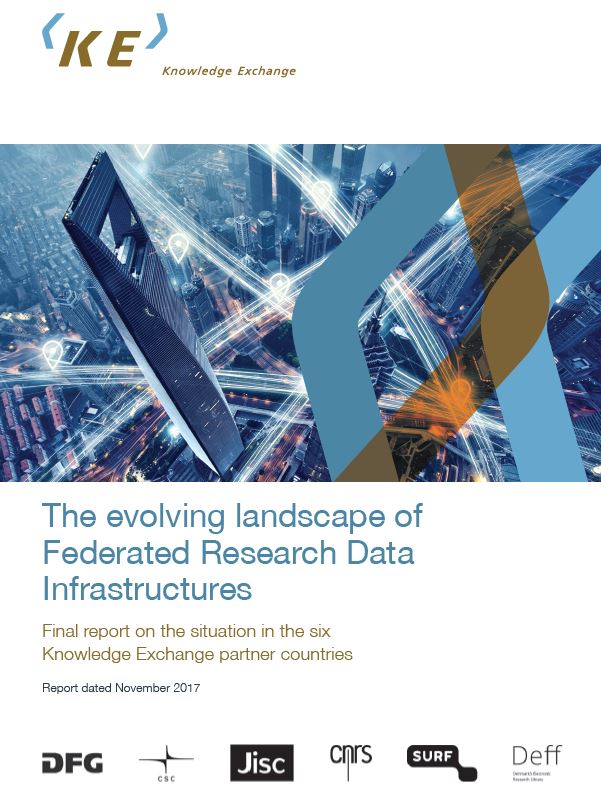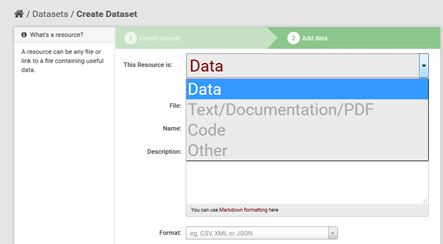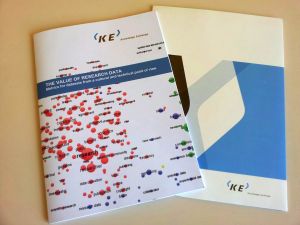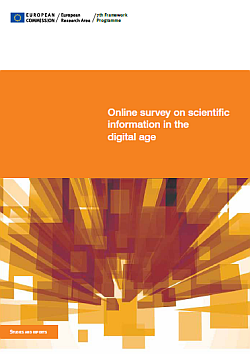Posted: November 30th, 2017 | Author: Sven | Filed under: Report | Tags: infrastructure, Knowledge Exchange, Research Data | Comments Off on New KE-report: ‘The Evolving Landscape of Federated Research Data Infrastructures’
 Knowledge Exchange, a consortium of six national organisations in Europe tasked with developing infrastructures and services to enable the use of digital technologies to improve higher education and research, has just a released a report on federated research data infrastructures.
Knowledge Exchange, a consortium of six national organisations in Europe tasked with developing infrastructures and services to enable the use of digital technologies to improve higher education and research, has just a released a report on federated research data infrastructures.
In 2016, the Knowledge Exchange Research Data expert group identified a need for better understanding of the nature and consequences of research and data infrastructure being more and more federated. Work was designed to find answers to questions such as ‘Which are the main drivers for federating RD infrastructures and services ? What are the expected benefits? What are the consequences for research and researchers? What challenges and issues arise when making a federated research data infrastructure function well?’ Read the rest of this entry »
Posted: February 8th, 2016 | Author: Sven | Filed under: EDaWaX | Tags: application, ckan, documentation, Research Data, Software | Comments Off on Documentation of EDaWaX’s CKAN-Application: First draft available
 One of the primary objectives of the EDaWaX-project is the development of a software application which intends to facilitate the management of research data for journals in the social sciences (and especially for those in economics and business studies).
One of the primary objectives of the EDaWaX-project is the development of a software application which intends to facilitate the management of research data for journals in the social sciences (and especially for those in economics and business studies).
The software application is approaching its public release at the end of the current funding term in late April. But we are already very far with the software’s developement. For those of you who can’t await the public release, we have just published a very first draft version (Version 0.1) of the application’s documentation. Even though there are still some parts of the functionalities that are not yet covered by the documentation, interested readers and researchers can get a picture of the application’s functionalities and features.
Read the rest of this entry »
Posted: October 11th, 2013 | Author: Sven | Filed under: Conference, EDaWaX, Report | Tags: Research Data, research paper | Comments Off on EDaWaX: State of affairs
 As you might have noticed, currently I don’t have much time to publish new articles on the blog. The reason is that our project is currently publishing a lot of the results we achieved in the course of the last two years.
As you might have noticed, currently I don’t have much time to publish new articles on the blog. The reason is that our project is currently publishing a lot of the results we achieved in the course of the last two years.
One of these publications has been published yesterday – it is a nice summary of the project’s main results, but still not all of them. The paper “Replizierbare Forschung in den Wirtschaftswissenschaften erhöhen – Eine Herausforderung für wissenschaftliche Infrastrukturdienstleister” is available online. Read the rest of this entry »
Posted: August 8th, 2013 | Author: Sven | Filed under: found on the net | Tags: economics, open access, Open Data, Research Data | Comments Off on Endorse the Open Economics Principles!
 As I mentioned in one of my previous posts, the Open Economics Working Group has just finalised the Open Economic Principles. Now it is also possible to endorse these principles online. In an e-mail the working group announces:
As I mentioned in one of my previous posts, the Open Economics Working Group has just finalised the Open Economic Principles. Now it is also possible to endorse these principles online. In an e-mail the working group announces:
The Open Economics Working Group would like to introduce the Open Economics Principles, a Statement on Openness of Economic Data and Code. A year and a half ago the Open Economics project began with a mission of becoming central point of reference and support for those interested in open economic data. In the process of identifying examples and ongoing barriers for opening up data and code for the economics profession, we saw the need to present a statement on the guiding principles of transparency and accountability in economics that would enable replication and scholarly debate as well as access to knowledge as a public good. Read the rest of this entry »
Posted: July 23rd, 2013 | Author: Sven | Filed under: found on the net, German, Report | Tags: infrastructure, Research Data | 1 Comment »
 The German project RADIESCHEN / radish (Rahmenbedingungen einer disziplinübergreifenden Forschungsdateninfrastruktur /Framework for an inter-disciplinary research data infrastructure) has published the project’s synthesis in English. The objective of this DFG-funded project was the development of a roadmap and recommendations for a multi-disciplinary research data infrastructure in Germany.
The German project RADIESCHEN / radish (Rahmenbedingungen einer disziplinübergreifenden Forschungsdateninfrastruktur /Framework for an inter-disciplinary research data infrastructure) has published the project’s synthesis in English. The objective of this DFG-funded project was the development of a roadmap and recommendations for a multi-disciplinary research data infrastructure in Germany.
The project team identified requirements for generic components of existing infrastructures and potential for cross-linking of multi-disciplinary components. The resulting analysis is based on a survey of existing and new projects and includes measures for community building. Key aspects of the analysis are the technical components of the infrastructure, the cost model and the investigation of cross-disciplinary topics.
Photo: “Lachdieschen” by dwarslöper / flickr.com. License: CC-BY-NC-SA 2.0 DE
Posted: April 16th, 2013 | Author: Sven | Filed under: Report, Workshop | Tags: Knowledge Exchange, Report, Research Data | 1 Comment »
 Last week I’ve been in Berlin and took part in the workshop “Making Data Count: Research data availability and research assessment” hosted by Knowledge Exchange (KE), a 2005 established cooperation between five research funders.
Last week I’ve been in Berlin and took part in the workshop “Making Data Count: Research data availability and research assessment” hosted by Knowledge Exchange (KE), a 2005 established cooperation between five research funders.
The aim of the workshop was to bring experts and stakeholders from research institutions, universities, scholarly societies and funding agencies together in order to review, discuss and build on possibilities to implement the culture of sharing and to integrate publication of data into research assessment procedures. Read the rest of this entry »
Posted: October 12th, 2012 | Author: Sven | Filed under: Report | Tags: data management, Report, Research Data | Comments Off on GESIS publishes “Guidelines for the Management of Research Data – Social Sciences Survey Data”
 GESIS – the Leibniz Institute for the Social Sciences has just released the technical report “Guidelines for the management of research data – social sciences survey data.”
GESIS – the Leibniz Institute for the Social Sciences has just released the technical report “Guidelines for the management of research data – social sciences survey data.”
The report is available in German only, but the eighty pages thick document covers a lot of important topics:
Starting with some general recommendations for the exploration of the data available at an institution and issues of privacy protection and responsibility for research data, the report also provides a useful checklist for the management of research data in the first chapter.
Other chapters deal with organisational and technical aspects of data preparation and documentation (chapter 2) or organisational and technical issues of safeguarding data and documents (chapter 3).
Chapter 4 discusses metadata standards, focussing on DDI (Data Documentation Initiative) and persistent identificators (DOI -> da|ra, DataCite). Chapter 5 covers perpetual access to research data and some legal questions. The report concludes with an overview of the services GESIS provides for the management of research data, e.g. digital long-term preservation.
Posted: August 27th, 2012 | Author: Sven | Filed under: Projects, Report | Tags: data citation, Research Data, roles for libraries | Comments Off on ODE Project: New Report on on Best Practices for Citability of Data and on evolving Roles in scholarly Communication
 With the ever increasing availability of data, the best way to ensure its sharing and re-use is becoming a prominent issue. Finding data and understanding data are the first steps in such a process and good data citation is an important prerequisite to enable this. New roles are evolving to support researchers in this process with support in managing, archiving, discovering, interpreting and citing data. Read the rest of this entry »
With the ever increasing availability of data, the best way to ensure its sharing and re-use is becoming a prominent issue. Finding data and understanding data are the first steps in such a process and good data citation is an important prerequisite to enable this. New roles are evolving to support researchers in this process with support in managing, archiving, discovering, interpreting and citing data. Read the rest of this entry »
Posted: June 8th, 2012 | Author: Sven | Filed under: Data Sharing | Tags: DataCite, Datasets, DOI Registration, persistent identifiers, Research Data | Comments Off on Canadian Research Data Registration Service launched
 The National Research Council’s Canada Institute for Scientific and Technical Information (NRC-CISTI), as Canada’s national science library, has launched a research data registration service that will help the research community address a long-standing challenge to make valuable research data easier to find so they can be leveraged and exploited for other research purposes.
The National Research Council’s Canada Institute for Scientific and Technical Information (NRC-CISTI), as Canada’s national science library, has launched a research data registration service that will help the research community address a long-standing challenge to make valuable research data easier to find so they can be leveraged and exploited for other research purposes.
NRC-CISTI has established DataCite Canada to serve as a central research dataset registration service that will enable Canadian data centres to register research datasets and assign digital object identifiers (DOIs) to them. As the name suggests, DataCite Canada is a member of the DataCite Consortium. DataCite is part of the International DOI Foundation (IDF). Read the rest of this entry »
Posted: May 7th, 2012 | Author: Sven | Filed under: Projects, Research Data | Tags: RDM, Research Data, tools | Comments Off on Digital Curation Centre refreshed their catalogue of tools and services
 The Digital Curation Centre (DCC) has just refreshed and replenished their catalogue of tools and services for managing and curating research data.
The Digital Curation Centre (DCC) has just refreshed and replenished their catalogue of tools and services for managing and curating research data.
Beside a new look the catalogue has been overhauled to focus on software and services that directly perform curation and management tasks.
Read the rest of this entry »
Posted: April 17th, 2012 | Author: Sven | Filed under: Report | Tags: academic publishing, European Commission, Open Data, Research Data | 1 Comment »
 These days, the European Commission has just published the results of a consultation regarding accessibility and preservation of digital publications and research data in the European Union.
These days, the European Commission has just published the results of a consultation regarding accessibility and preservation of digital publications and research data in the European Union.
Commissioner Neelie Kroes, responsible for the digital agenda for Europe, has launched this consultation in July 2011 for seeking views on access to and preservation of digital scientific information – to be more precisely, the survey broached the issues of Open Access for scientific publications, accessibility of research data and digital long term preservation.
The purpose of the consultation was to gather information from as many sources as possible and receive important input for the future development of policy options in the area of scientific information in the digital age.
Read the rest of this entry »
Posted: February 27th, 2012 | Author: Sven | Filed under: fraud, Research Data | Tags: investigation, manipulation, Publications, Research Data | Comments Off on Psychology: The Rise of false-positive Findings
 In the November 2011 Issue of Psychological Science, Joseph P. Simmons, Leif D. Nelson and Uri Simonsohn published an interesting article about the undisclosed flexibility in data collection, analysis, and reporting that leads to an increase of actual false-positive rates in psychology. The researchers stated that it is unacceptably easy to publish “statistically significant” evidence consistent with any hypothesis.
In the November 2011 Issue of Psychological Science, Joseph P. Simmons, Leif D. Nelson and Uri Simonsohn published an interesting article about the undisclosed flexibility in data collection, analysis, and reporting that leads to an increase of actual false-positive rates in psychology. The researchers stated that it is unacceptably easy to publish “statistically significant” evidence consistent with any hypothesis.
The major problem they found is what they call the “researcher degrees of freedom” – or to be more correct: the decisions researchers making within a research process: e.g. what observations should be included or rejected? How much data should be collected? Which control variables should be used?
Read the rest of this entry »
Posted: February 22nd, 2012 | Author: Sven | Filed under: Workshop | Tags: metadata, persistent identifiers, Research Data | Comments Off on Announcement: Workshop “Metadata and Persistent Identifiers for Social and Economic Data”
 The German Data Forum (RatSWD), the GESIS Leibniz Institute for the Social Sciences, nestor – the German Competence network for digital preservation, the International Data Service Center of the Institute for the Study of Labor (IDSC) and the Leibniz Information Centre for Economics (ZBW) will be hosting a joint workshop on the subject of
The German Data Forum (RatSWD), the GESIS Leibniz Institute for the Social Sciences, nestor – the German Competence network for digital preservation, the International Data Service Center of the Institute for the Study of Labor (IDSC) and the Leibniz Information Centre for Economics (ZBW) will be hosting a joint workshop on the subject of
„Metadata and Persistent Identifiers for Social and Economic Data“
which will take place on 7th and 8th May 2012 in Berlin and to which you are cordially invited.
Attendance is free, registration is requested.
For registration and more information, please visit: http://www.ratswd.de/pid_2012
The full program ist attached below. Additional information may be found on our download page and here.
Read the rest of this entry »
Posted: November 15th, 2011 | Author: Sven | Filed under: Report | Tags: Knowledge Exchange, Research Data, Vision | 6 Comments »
 Following the report “Riding the Wave: How Europe can gain from the rising tide of scientific data” that was released 2010 by the high level expert group on research data, the Knowledge Exchange (KE) partners have embraced this vision and commissioned a report that translates Riding the Wave into actions for the four partner countries and beyond.
Following the report “Riding the Wave: How Europe can gain from the rising tide of scientific data” that was released 2010 by the high level expert group on research data, the Knowledge Exchange (KE) partners have embraced this vision and commissioned a report that translates Riding the Wave into actions for the four partner countries and beyond.
The report was presented today during a KE workshop in Bonn.
The Report “A Surfboard for Riding the Wave” builds on the 2010 report and presents an overview of the present situation with regard to research data in Denmark, Germany, the Netherlands and the United Kingdom and offers broad outlines for a possible action programme for the four countries in realising the envisaged collaborative data infrastructure.
While the 2010 report of the high level expert group on research data presented a vision for the year 2030, the report of KE concretizes this vision for the four countries.
Read the rest of this entry »
Posted: November 2nd, 2011 | Author: Sven | Filed under: fraud | Tags: fraud, investigation, manipulation, Netherlands, Research Data | Comments Off on Nature Magazine: Massive Fraud at Dutch Universities
 The nature magazine reported that the famous Dutch psychologist Diederik Stapel had manipulated research data for years.
The nature magazine reported that the famous Dutch psychologist Diederik Stapel had manipulated research data for years.
A Report [in Dutch] claimed that the prominent researcher of Tilburg University fabricated some of his eye-catching studies on social behaviour.
Actually at least 30 papers in peer-reviewed journals are in the focus of a committee that investigates the work of the researcher.
The report says that Stapel often came up with a hypothesis and then designed an experiment to test it. Stapel took responsibility for collecting data and a few weeks later he produced a fictitious data file. In other cases Stapel received co-authorship after producing data he claimed to have collected previously that surprisingly exactly matched the needs of a colleague working on a study.
The data themselves were also curios the report mentioned: effects were large; missing data and outliers were rare; and hypotheses were rarely refuted.
Journals publishing Stapel’s papers did not question the omission of details about where the data came from.
In September Stapel was suspended from his position at Tilburg University – three young researchers had found irregulartities within his published data. An investigation followed – containing further papers and occupations in other universities, where Stapel worked prior to Tilburg University.
This is just another example that reflects the needs of publishing articels with their related research data. A task that is important for the quality of research as well as for the quality of scholarly journals.
Photo: ‘Fraud Key‘ by GotCredit on flickr.com. License: CC-BY-2.0
 Knowledge Exchange, a consortium of six national organisations in Europe tasked with developing infrastructures and services to enable the use of digital technologies to improve higher education and research, has just a released a report on federated research data infrastructures.
Knowledge Exchange, a consortium of six national organisations in Europe tasked with developing infrastructures and services to enable the use of digital technologies to improve higher education and research, has just a released a report on federated research data infrastructures.
 One of the primary objectives of the EDaWaX-project is the development of a software application which intends to facilitate the management of research data for journals in the social sciences (and especially for those in economics and business studies).
One of the primary objectives of the EDaWaX-project is the development of a software application which intends to facilitate the management of research data for journals in the social sciences (and especially for those in economics and business studies). As you might have noticed, currently I don’t have much time to publish new articles on the blog. The reason is that our project is currently publishing a lot of the results we achieved in the course of the last two years.
As you might have noticed, currently I don’t have much time to publish new articles on the blog. The reason is that our project is currently publishing a lot of the results we achieved in the course of the last two years. As I mentioned in one of my
As I mentioned in one of my  The German project
The German project 


 The Digital Curation Centre (
The Digital Curation Centre ( These days, the European Commission has just published the
These days, the European Commission has just published the  In the November 2011 Issue of
In the November 2011 Issue of  The German Data Forum (
The German Data Forum (







